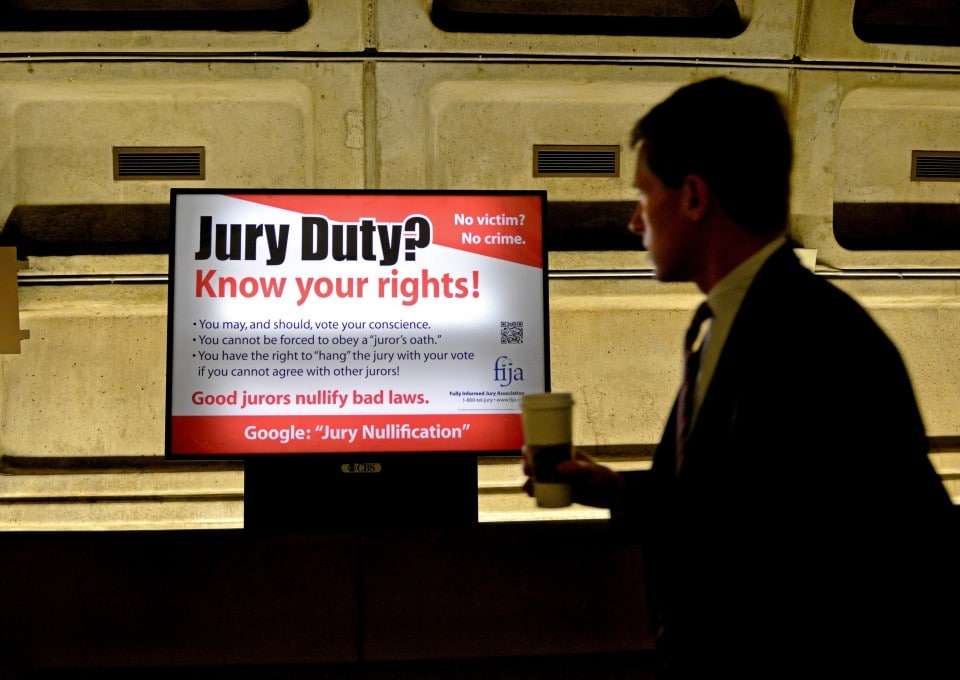The Volokh Conspiracy
Mostly law professors | Sometimes contrarian | Often libertarian | Always independent
First Amendment banned from D.C. Metro -- literally!

In November 2015, the Washington Metropolitan Area Transportation Authority (WMATA), operator of the Washington public transit (bus and Metro) system, amended guidelines regarding commercial advertisements that it would accept for Metro cars and Metro stations. The guidelines contain 14 numbered restrictions, including these four:
- Guideline 4: Prohibiting "medical and health-related messages" unless they are from "government health organizations," or if "the substance of the message is currently accepted by the American Medical Association and/or the Food and Drug Administration."
- Guideline 9: Prohibiting "advertisements intended to influence members of the public regarding an issue on which there are varying opinions."
- Guideline 13: Prohibiting "advertisements that support or oppose an industry position or industry goal without any direct commercial benefit to the advertiser."
- Guideline 14: Prohibiting "advertisements that are intended to influence public policy."
Ostensibly applying these guidelines, WMATA made some rather peculiar decisions, refusing, for example, to accept advertisements from:
- Right-wing provocateur Milo Yiannopoulos promoting his new book, "Dangerous" (Guideline 14: intended to influence public policy).
- The animal rights group PETA urging readers to "Go Vegan" and to "De-Calf your Coffee" (Guideline 13: opposing an industry position/goal without direct commercial benefit to PETA).
- Carafem, a nonprofit organization that provides abortion care and family planning services through a network of health centers, promoting the "10-Week After Pill" (i.e. medication to induce miscarriage within the first 10 weeks of pregnancy), available at its clinics (Guideline 4: health-related message not approved by the government, the AMA, or the FDA).
And, rather astonishingly, WMATA rejected an ACLU ad consisting of nothing but the text of the First Amendment (in English, Spanish and Arabic) alongside the ACLU logo (Guideline 9: intended to influence the public "regarding an issue on which there are varying opinions" (!!))
[The rejected ads can all be seen here.]
The ACLU recently filed suit on behalf of itself, Yiannopoulos, Carafem and PETA in D.C. federal district court arguing that the WMATA policy is a violation of the First Amendment both on its face and as applied to the plaintiffs. [The complaint is posted here.]*
Note * Apparently, the ACLU has taken some heat from its supporters for including Yiannopoulos as a co-plaintiff. That is unfortunate; the ACLU's habit of taking the position that speech - even speech we might regard as offensive, from people we might regard as offensive - is worthy of protection may be maddening at times, but it is a highly principled one, and is itself worthy of support and protection.
The plaintiffs, surely, have a strong case. On what possible grounds can WMATA defend rejecting an advertisement consisting of the text of the First Amendment? Who decides whether any particular issue is one "on which there are varying opinions," and on what basis is that decision made? Why should PETA's non-commercial message ("Don't eat meat") be prohibited while Burger King's commercial message ("Eat more meat") is allowed?
WMATA will undoubtedly rely heavily on Lehman v. City of Shaker Heights (1974), a case in which the Supreme Court upheld (5 to 4) a ban on all "political advertising" in the Shaker Heights transit system. The court there rejected the notion that the rail and bus cars constitute "a public forum protected by the First Amendment" with a "guarantee of nondiscriminatory access to such publicly owned and controlled areas of communication."
"The streetcar audience is a captive audience. It is there as a matter of necessity, not of choice. … Here, we have no open spaces, no meeting hall, park, street corner, or other public thoroughfare. Instead, the city is engaged in commerce. It must provide rapid, convenient, pleasant, and inexpensive service to the commuters of Shaker Heights. The car [advertising] space, although incidental to the provision of public transportation, is a part of the commercial venture. In much the same way that a newspaper or periodical, or even a radio or television station, need not accept every proffer of advertising from the general public, a city transit system has discretion to develop and make reasonable choices concerning the type of advertising that may be displayed in its vehicles.
The level of scrutiny such governmental action would receive would be low: the choices must simply be "reasonable," and "the policies and practices governing access to the transit system's advertising space must not be arbitrary, capricious, or invidious."
The ACLU's complaint argues that the guidelines constitute "viewpoint discrimination" of a kind that was not present in Lehman - allowing messages that reflect the AMA's (or the government's) views on health-related matters, or those that reflect commercial positions on "industry goals," while rejecting advertisements reflecting other viewpoints - requires the court to engage in a more exacting First Amendment analysis.
They may well succeed in that argument. Even if they don't, though, it's hard to see a a court upholding WMATA's decision here even under the relaxed "reasonableness" standard. To my eye, these certainly do look like the kind of "arbitrary, capricious, or invidious" decisions that, even under a generous reading of Lehman, WMATA, as a state actor, has to steer clear of.


Show Comments (0)